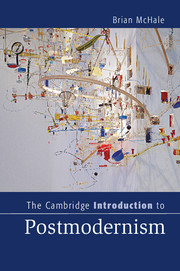Book contents
5 - After Postmodernism
Published online by Cambridge University Press: 05 July 2015
Summary
Millennium Approaches … and Recedes
When did postmodernism end? It ought to have ended when the calendar rolled over from December 31, 1999 to January 1, 2000. Though not technically the beginning of the new millennium (which really occurred on January 2, 2001), this was the date that postmodern culture and popular imagination had identified as the apocalyptic threshold when everything would change. When the pop star known as Prince (Prince Rogers Nelson) wanted in 1982 to evoke the ultimate party, he urged his listeners to “Party like it's 1999” – in other words, like it's the eve of the apocalypse. Nineteen ninety-nine is also the date of the nuclear incident that disrupts global civilization in Wim Wenders's 1991 film Until the End of the World (see Chapter 4). It is the date when the entire human species uploads itself into its virtual-reality entertainment systems and physically vanishes from the face of the earth, according to J. G. Ballard's story “Report from an Obscure Planet” (1992). It is the date of the apocalyptic civil unrest in Kathryn Bigelow's updated cyberpunk film Strange Days (1995), an important link in the cinematic genealogy that runs from Blade Runner (1982) to The Matrix (1999). Not coincidentally, the interrupted New Year's Eve party at the climax of Bigelow's film is set in the Westin Bonaventure Hotel, revisiting the site that Fredric Jameson made iconic for postmodern architecture (see Chapter 3).
The Year 2000, in short, was the millennium whose approach is heralded, with equal parts anxiety and anticipation, in Kushner's Angels in America (see Chapter 4) and almost everywhere else in postmodern culture. The apocalyptic resonances of the date in the popular imagination were reinforced and amplified by hard-headed computer engineers and IT personnel, who predicted that computer systems would crash worldwide on New Year's Eve 1999 because they had not been programmed to roll over to dates beginning with “2000.” The so-called “millennium bug” threatened to bring vital computer-dependent systems, including air traffic control, power stations, telecommunications, and banking, to a grinding halt, and with them the postmodern world as we knew it.
- Type
- Chapter
- Information
- The Cambridge Introduction to Postmodernism , pp. 171 - 200Publisher: Cambridge University PressPrint publication year: 2015
- 1
- Cited by

